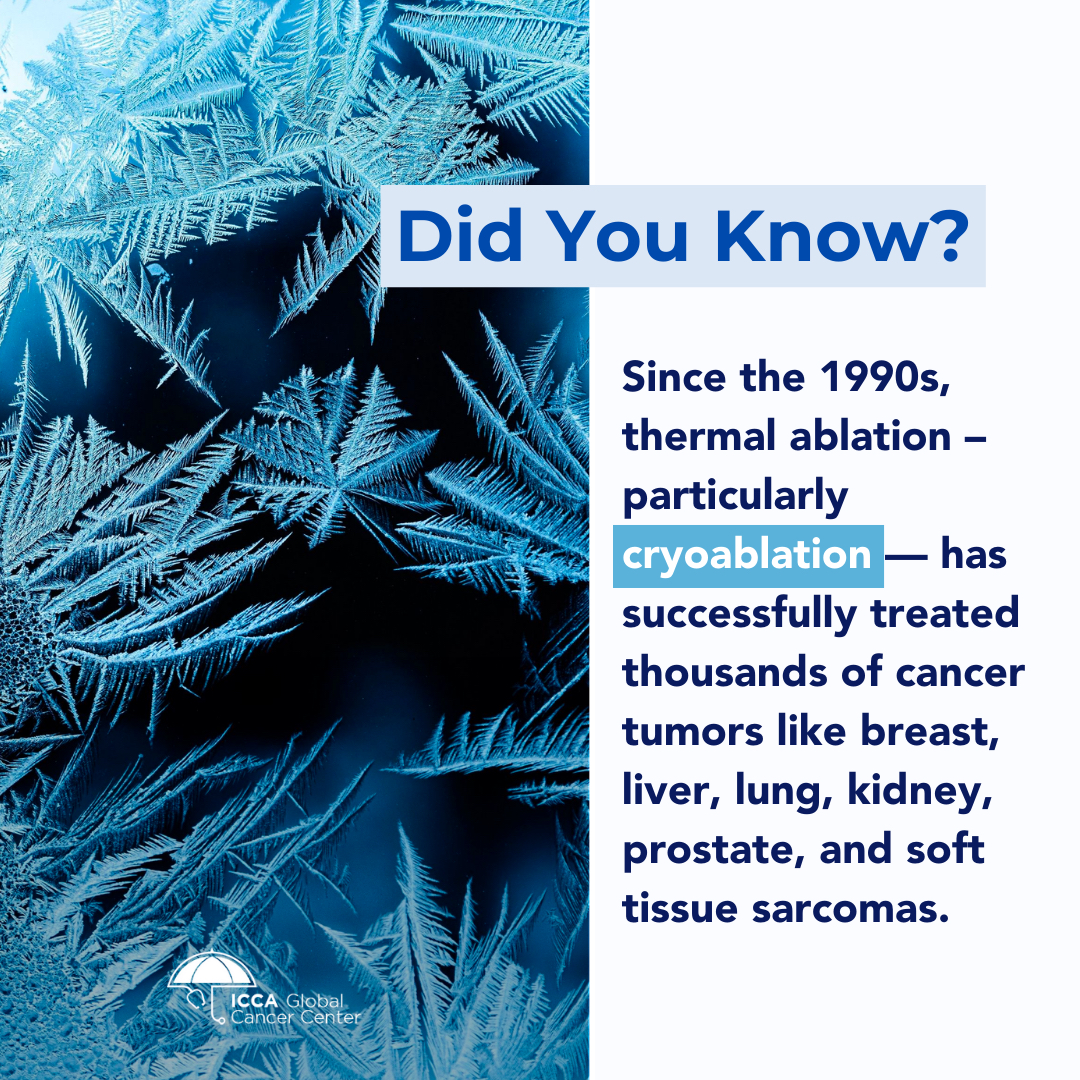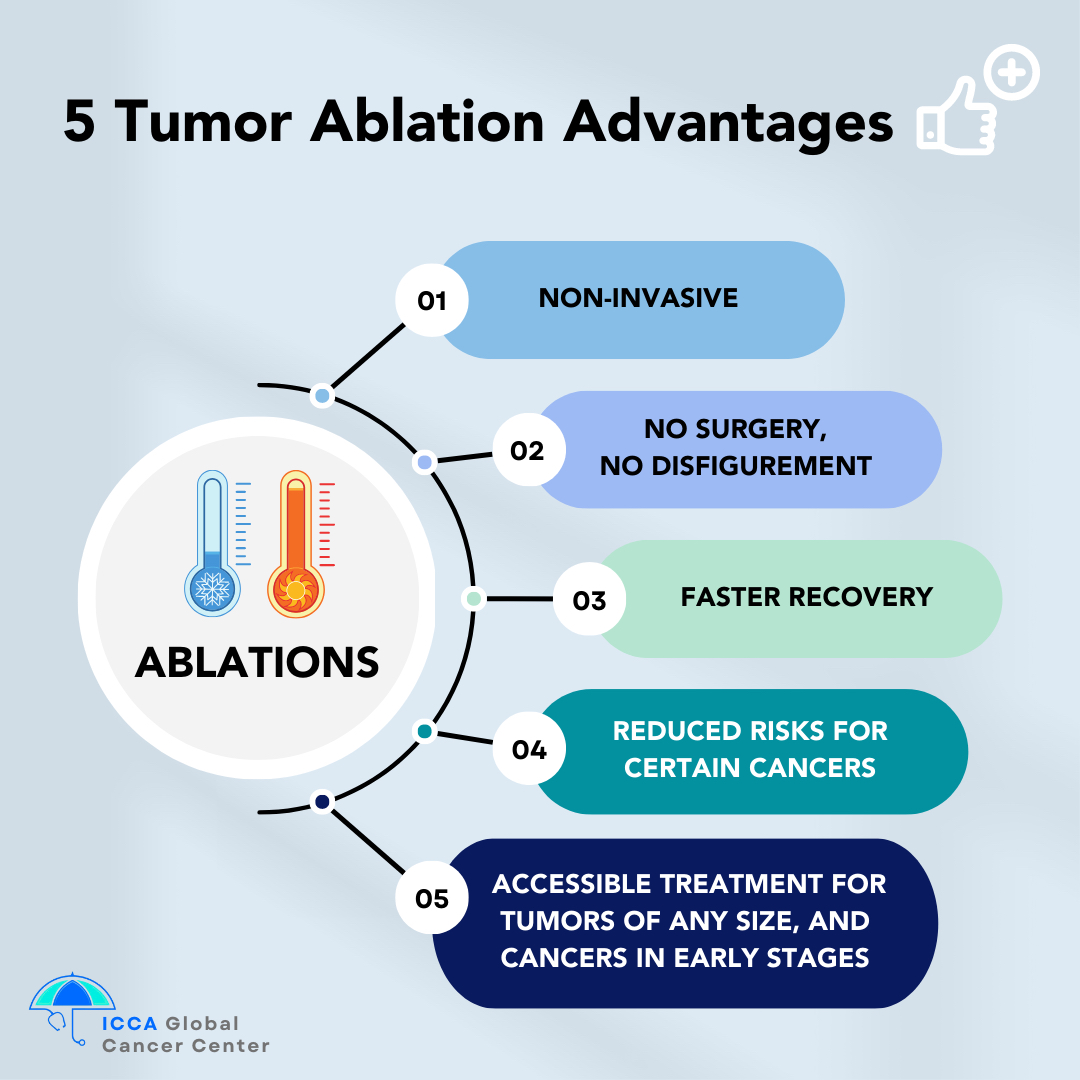DON'T LET
TUMOR SURGERY
DISFIGURE YOUR BODY
OR YOUR MIND!
New options for a better, alternative/integrative cancer treatment experience: Introducing non-surgical, Five Point Cancer Care Tumor Ablations
FivePoints Cancer Care is a comprehensive program to treat cancer tumors, developed by Integrative Cancer Centers of America.
What is Tumor Ablation?
Tumor ablation is a minimally invasive treatment for cancer in which physicians use heat or cold to destroy cancer cells. It also known as radiofrequency ablation or cryoablation. The goal of this treatment is to destroy the tumors without harming surrounding healthy tissue. During the procedure, medical professionals use imaging technology such as ultrasound or MRI to help guide the needle into the tumor and direct energy (heat or cold) at the tumor itself.


Cryoablation: How it works
Treat Your Cancer

An Exceptional Global Cancer Center Treating Primary, Late-Stage and Recurrent Cancers
ICCA's primary mission is to conquer aggressive cancers that are often deemed untreatable by others. Using integrative and cutting-edge techniques, we strive for significant tumor shrinkage, reduction, and even full necrosis (tumor death) without harming surrounding healthy tissues. But we don't just strive for treatment success, we prioritize the patient's well-being, minimizing side effects and working with you every step of the way towards healing. Our team works with you one-on-one and offers customized treatment plans, so your entire FivePoints Cancer Care team becomes your partner during the healing process.
FivePoints Cancer Care
Treat Tumors with Thermal Ablation, Not Surgery!
Advantages of Tumor Ablation over Surgery
Destroy Tumors by Thermal Ablation
Since the 1990s, tumor ablation has successfully treated thousands of cancer tumors like breast, liver, lung, kidney, prostate cancers, and soft tissue sarcomas! Thermal ablations are typically used to treat smaller and/or non-surgical tumors or poor candidates for surgery. However, with the use of multiple probes, physicians have treated increased the size of tumors appreciably over the last decade.

I AM CANCER FREE, HALLELUJAH, I AM CANCER FREE!!
The Benefits of Tumor Ablation
Tumor ablation has several advantages over other treatments for cancer patients. First, it’s relatively noninvasive and doesn’t require surgery or chemotherapy. Additionally, it can be done on an outpatient basis and requires only local anesthesia, meaning there’s no need for general anesthesia or hospitalization during recovery time. Furthermore, because the treatment targets only the tumor itself, rather than healthy tissue around it, side effects are usually minimal compared to other forms of cancer treatment.
Because tumor ablation destroys only tumor cell, not healthy cells around them, and part of the FivePoints Cancer Care treatment program, there’s less risk of recurrence as compared to other more conventional cancer treatment programs.
Types of Tumor Ablations
Thermal Ablation
Thermal ablation is a minimally invasive, image-guided treatment that uses heat or extreme cold to destroy (or coagulate) cancerous tumor cells and most solid tumors. This very simple procedure uses A thin, wand-like needle called a cryoprobe to insert through the skin directly into cancerous tissue. One or more cryoprobes may be used. Argon or nitrogen gas flows through a tube into the cryoprobe, which brings the temperature at the tumor down to very low levels. These very cold temperatures freeze and destroy the tumor.
Microwave Ablation
Micro Tumor Ablation (tissue destruction), is a simple, non-surgical procedure using a number of different applications, including:
Microwave ablation destroys tumors using heat generated by microwave energy. With microwave ablation, the surgeon inserts a small laparoscopic port or open incision to access the tumor. A CT scan or ultrasonic guidance is used to pinpoint the exact location of the tumor. A thin antenna, which emits microwaves, is then inserted into the tumor. The probe produces intense heat that ablates (destroys) tumor tissue, often within 10 minutes.
Microwave ablation has several advantages when compared to traditional RFA, a standard method for ablating liver tumors, These include:
Our treating physicians are among a select group of cancer specialists that offer microwave ablation (MWA) to treat inoperable tumors, particularly liver – which include hepatocellular carcinoma (primary liver cancer), a disease associated with cirrhosis and hepatitis B and C, and metastatic liver tumors. Because the liver has two blood supplies and a ready store of growth factors, it is a fertile site for liver metastases, liver tumors originating elsewhere in the body. Abdominal cancers, and especially colorectal cancer, frequently metastasize to the liver.
Cryoablation
Very simply, a minimally-invasive procedure that uses extreme cold to destroy cancer cells that cannot survive cold temperatures – allowing physicians to freeze the lethal cancer cells without harming any surrounding healthy tissue. Cryoablation is an increasingly viable and accessible treatment for cancer tumors, particularly smaller tumors, and cancers in their earlier stages.
Cryoablation can have advantages over other thermal ablations (e.g., microwave, radiofrequency, ultrasound, or electroporation) because it offers greater image monitor and greater control over the size and shape of ablation zone, and pain mitigation and works well with adjuvant therapies (e.g., chemotherapy, immunotherapy, radiotherapy, etc.) for ultimate destruction of cancer tissue.
Applying cold temperatures to treat fractures and wounds has been around since 3000 B.C. with the most common cooling fluids consisting of nitrogen or argon, which rapidly expand into gas, creating exceptionally low lethal temperatures called the Joule-Thomson effect.


We look forward to hearing from you!
Innovative Tumor Ablation Technology: Fewer Risks, Shorter Recovery Time

MINIMALLY INVASIVE
Tumor ablation is minimally invasive, requiring a small incision at most, often done by simple local anesthesia – thus avoiding complications usually associated with surgery (e.g., pain, blood loss, side effects from general anesthetic) Additionally, surgery can be physically taxing and often requires extensive preparation; whereas cryotherapy requires very little preparation and simple to perform.
FASTER RECOVERY
Tumor ablation is significantly shorter than conventional surgery. Most patients return to their normal lives the same day, while others can return to everyday activities within a few days.
FEWER SIDE EFFECTS
Conventional tumor surgery involves cutting away nearby tissue or even removing whole organs sometimes, which often has a huge effect on ongoing health. Tumor ablation is much more precise and localized, leaving surrounding tissue intact. Extended chemotherapy and long-session radiation therapy often result in harsh side effects, including nausea, vomiting, and gastrointestinal problems. Many forms of chemotherapy and radiation therapy can seriously damage the immune system.
REDUCED RISKS FOR CERTAIN CANCERS
Surgical treatments for bone cancers can be tricky. They often come with a high risk of joint damage. In some cases, surgery may lead to a full amputation. Cryoablation therapy for bone cancer may reduce the risk of joint damage and the need for amputation.
Talk to a FivePoints Cancer Care Patient Navigator.
We are ready to help anytime. Let's talk about restoring your life!
Is Tumor Ablation Right for You?
A highly accurate and much less invasive form of cancer treatment, tumor ablation is recommended for numerous types of both common and rare cancers and tumors, including but not limited to:
Talk to a FivePoints Cancer Care Patient Navigator.
How can we help?


